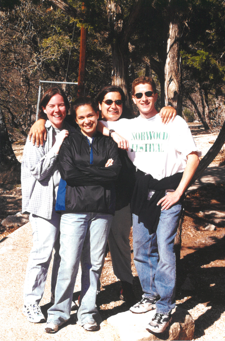During AmeriCorps’ 30th anniversary, we celebrate and recognize members and alums committed to making a difference in our communities. Alum Trent Engbers, recipient of the first Harris Wofford Joint Service Awards, shares how he found his path to a lifetime of service with AmeriCorps.
I first started thinking about a long-term service experience when I was in college. I attended a university that strongly emphasized service or what we called “men and women for others.” I had picked a major for pragmatic reasons and was doing well in school, but the best part of college was being a leader in the community. When I graduated, I wanted to extend this experience by serving with AmeriCorps through the Jesuit Volunteer Corps as a public housing community organizer from 1999 to 2000.
AmeriCorps profoundly impacted me in two ways – working with a diverse group of people and developing skills in community organizing. I grew up in a midsize midwestern city and attended private school for more than 20 years. The chance to work with residents of public housing projects in urban Birmingham, Ala., was an adjustment. For the first time in my life, I was in the minority in regard to race, sex, and religion. Navigating that cultural experience was a valuable learning experience. Through my AmeriCorps service, I had the opportunity to learn how to engage communities to address their problems and mobilize residents for action. Since then, I have worked on countless community engagement projects using the skills I learned in Alabama.

During my service, I didn’t have a car. I commuted from home to the office and into the neighborhoods where I worked on a bicycle I purchased with my monthly stipend. I remember riding through a high-crime public housing complex one night and getting a shoutout – the good kind – from some kids on the street. It was an unforgettable moment for me because I felt that I had been accepted, regardless of our differences. This sense of community and its importance, which can be found in unlikely places, has continued to be a theme in my personal and professional career since then.
After my AmeriCorps service, I met my wife. We were engaged to be married when we were both at a point in our careers looking for a transition. I had often shared how impactful my volunteerism and AmeriCorps service had been, so we decided to join the Peace Corps together for a transformative experience. It wasn’t an easy way to spend our first year of marriage, but it bonded and helped us commit to a marriage of service to each other and the community.
We served in China from 2005 to 2007. During most of our service, we taught English at a university, but during the summer between our first and second year, we taught at a summer training program for rural English teachers. Though many knew grammar rules better than we did, I had the opportunity to teach a short course on American culture. The course included table manners, popular culture such as marriage and dating patterns, and some good sports knowledge. One of the moments of great laughter was when we taught them the beans song, “Beans, beans, the magical fruit…” I still smile when I picture my Chinese colleagues singing that song. Yet, despite the frivolity, there was an important lesson in this - just because you speak the same language doesn’t mean that you can understand each other. Culture is much more profound and requires true exchange to learn.
Though it’s been several years since my service terms, I have continued to try and give back to my community. I have remained involved in my community and serve on the boards of several nonprofits and foundations. Serving those with disabilities is a particular passion of mine.
Today, I teach nonprofit management at the University of Southern Indiana, and working with community-based organizations is a daily occurrence. I have the opportunity to help shape the careers of future nonprofit professionals to exemplify standards of professionalism, ethics, and service. As I reflect on my service journey, my wife and I now try to induct our kids into a life of service. I will be very proud if they consider extended service when they get older, just as we did.
Dr. Trent A. Engbers is a Professor and Director of the Master of Public Administration Program at the University of Southern Indiana. He also maintains a secondary appointment as a visiting lecturer at the world-ranked Indiana University O’Neill School of Public and Environmental Affairs. He is a former Peace Corps volunteer, an experienced college educator, and a nonprofit consultant specializing in supporting nonprofit boards and fundraising initiatives. He is an award-winning teacher and was appointed a member of the Indiana Commission for Higher Education by Governor Eric Holcomb, where he served from 2019-2021. He recently completed a sabbatical at the University of Haifa in Israel in 2023. His research on leadership, economic development, and civic engagement has been published widely, including Social Science Quarterly, Public Administration Review, and the Journal of Leadership Education. Trent holds degrees from Xavier University, the University of Maryland, the University of Missouri, and Indiana University. He lives in Evansville with his wife Kimberly and four children.





